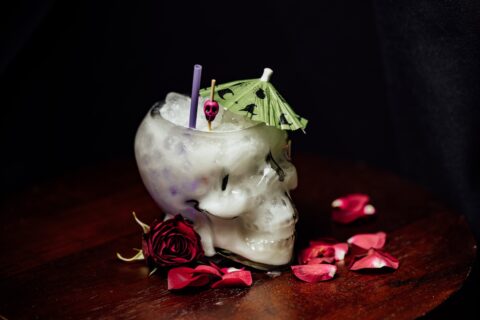The Local newsletter is your free, daily guide to life in Colorado. For locals, by locals.
A transformation has taken place in a once-nondescript storefront on the corner of Bijou Street and Cascade Avenue in downtown Colorado Springs. Adorned with a pride flag waving in the wind and a Black Lives Matter poster displayed in the front window, ICONS wants passersby to know exactly what it is: Colorado Springs’ newest (and only) LGBTQ piano and cocktail bar.
Patrons entering the lounge come face-to-face with portraits of queer icons known to tickle the ivories, like Lady Gaga and Nina Simone. Painted by local artist Molly McClure, they hang prominently against a deep cerulean wall with Art Deco accents. Sleek modern furniture and a black marble bar top complete the look, which owners Josh Franklin and John Wolfe affectionately refer to as a mix of class and camp.

“It seems like a no-brainer,” Franklin says, “but it truly is unique. Certainly, there are cocktail places, but they’re not necessarily queer places. And there are places that have live music, but they’re not classy-campy like we are. So it really is one-of-a-kind. ‘Clampy.’”

Franklin and Wolfe, who are engaged to be married in August, opened ICONS in the midst of the COVID-19 pandemic, a risky move for any new venture. But the couple says they have welcomed the chance to learn the ins and outs of the bar and restaurant industry before loosened restrictions opened the doors to a flood of customers. Both of them are far more accustomed to making curtain calls than signature drinks, having been performers on Broadway for the last two decades in beloved shows like Jersey Boys, Legally Blonde, and Grease. Owning a bar is new territory for the couple—but for Franklin, Colorado Springs isn’t.
Franklin’s story is all too similar to those of queer kids with dreams bigger than their small (or conservative) hometowns. After graduating from Dougherty High School in Colorado Springs, Franklin pursued his craft in the Big Apple, and for 20 years, he built a theatre career on Broadway. But he kept close ties to the local arts scene in Colorado Springs, and three years ago, lured Wolfe back to the Centennial State’s “Second City.” Both became enamored with its beauty, and impressed with its growth as a distinctive cultural hub in its own right.
They bought a home in the Spring’s bohemian westside neighborhood of Old Colorado City, turning it into an Airbnb for two years as they wrapped up a slate of shows they were scheduled to perform in New York City. Their permanent move to the Springs came about, in part, due to the pandemic. Franklin had temporarily headquartered himself in the rental while working on a show with the Colorado Springs Philharmonic in late 2019. “I didn’t realize at the time that I would be here, you know, indefinitely,” Franklin says. “I did not know the pandemic was coming. But I was thrilled that I was trapped in Colorado Springs instead of New York City.” Wolfe was on tour when the pandemic hit. After the show’s remaining dates were canceled, he joined Franklin in Colorado rather than returning to cramped quarters in New York.
The couple says the summer of 2020 was incredibly influential when it came to their decision to not only put down roots here, but open their own business. And it all started with what New Yorkers love about Colorado: square footage.
“It was 20 years of pent-up apartment living. We were like, ‘We have a backyard?’” Wolfe says. “And it was because we loved our backyard so much—that was a way for us to hang out with the people that we already knew and loved here. So kind of on accident, we would have these backyard fires that would turn into sing-alongs. It’s like-minded people in a similar demographic, like young professionals, who wanted a place to go hang out that wasn’t clubby.”
Though Colorado Springs is the second-largest city in Colorado with a population of almost 500,000 people, its offerings for the LGBTQ community are limited. The Springs was once home to the Gay and Lesbian Fund of Colorado, a Pride Center, multiple LGBTQ nonprofits, and gay bars like Hide ‘n’ Seek, The Underground Pub, and V-Bar.
Nearly every one of them has closed its doors, ceased operations or, in the case of the Gay and Lesbian Fund, moved to Denver. For some, like the Pride Center, influence waned and debts mounted. Others, like The Underground, changed hands and shifted to a different business model. Young people in the area can still visit Inside Out Youth Services, a nonprofit dedicated to queer youth (Full disclosure: This reporter is the communications manager for Inside Out.) But prior to ICONS coming to town, adults only had Club Q.
Proudly queer Club Q has stood as a bastion of the LGBTQ community where others have fallen. It’s where LGBTQ folks go for drag performances, dance parties, and drinks, and it supports the community with event sponsorships, pride celebrations, charity drives, and more. While the club has recently shifted to offering more low-key “dinner and a show” vibes before 10 p.m., it’s still known as the place for queer young adults to go and get their dance on.
And while Club Q is a valid option for a queer night out, Wolfe and Franklin say they were astonished that it was the Springs’ only option. Moreover, Club Q sits on North Academy Boulevard, a good 20 minutes’ drive from the accessibility of the Springs’ downtown core. As they hosted their campfire sing-alongs and discussed the possibility of a LGBTQ-centric bar downtown, friends carried the idea out into the community and generated too much buzz for the couple to ignore. The interest was there, they say, as was the opportunity.
“As soon as ICONS was an idea, it spread like wildfire,” Wolfe says. “It was like that snowball effect, and it took off without us even being ready for it. The town was so ready, people in charge of the city were really excited about it. And then everything just lined up.”
The couple got a good deal on the downtown space, and they renovated it themselves with help from their family. But they weren’t swimming in deep water alone. Nearby coffee joint Wild Goose Meeting House lent them a power washer to clean up ICONS’ now-swanky basement lounge; and they say the cocktail bar next door, Shame & Regret, has been a constant source of support and resources, from advice to extra ice.

All this, they say, has made it even easier to cultivate within the space a feeling of family and warm inclusivity, which may be ICONS’ biggest draw. The other? The music. Each staff member at ICONS is also a trained singer, and bartenders sing for patrons nightly—show-tunes, top-40 hits, crooner classics, and everything in between. About two months ago, Franklin and Wolfe erected a stage in ICONS’ front window, complete with plexi-glass siding to keep patrons and performers alike safe.
“I’m just gonna say we have the best singers in Colorado Springs, and probably in Colorado, at this bar,” Franklin says. “I believe that. So you don’t get to enjoy that entertainment without signing a social contract walking through the door that you accept queer people.”
Everything about ICONS, from its decor to its drinks to its staff, has been created to celebrate the queer community, the couple says.
That sentiment has, historically, been a rare one in Colorado Springs.
The Changing LGBTQ Scene
“I always take credit a little bit for ending up here again,” says Wolfe, who grew up in West Virginia and was first introduced to Colorado Springs by Franklin, “because I didn’t have any preconceived notions about the Springs, or baggage from growing up here as a queer kid in the ‘90s. I didn’t have any of that. I just showed up and was like, ‘Mountains! Music!’”
For Franklin, and many other local LGBTQ people, that baggage is real. Broad evangelical influence, especially in the ‘90s, made Colorado Springs a difficult place to live, and some who grew up here left with no intention of returning. “I couldn’t wait to get out of here,” Franklin says of his high school days. “I was going to run away, not walk.”
Though Colorado now boasts robust anti-discrimination protections for LGBTQ people and can claim its first openly gay governor, Jared Polis, as well as its first openly transgender legislator, Brianna Titone, the state has not always been an icon of progressivism—nor has the city of Colorado Springs.
In 1992, the Colorado legislature passed Amendment 2, which essentially denied LGBTQ individuals the right to be considered a protected class under anti-discrimination laws. This controversial amendment labeled Colorado the “hate state.”
Colorado Springs turned out to be the nexus of the pro-Amendment 2 crowd. Colorado for Family Values, a now-defunct anti-LGBTQ organization led by Colorado Springs car dealer Will Perkins, petitioned to place Amendment 2 in the state constitution, according to the Colorado Springs Pioneers Museum.
Colorado For Family Values wasn’t alone in their vitriol against LGBTQ people. In 1990, Focus on the Family, the staunchly anti-abortion and anti-LGBTQ evangelical organization, came to town, and launched radio shows, newsletters, and magazines to push its ideas. Its presence on the city’s north side remains a heavy weight on the queer community.
Rev. Dr. Nori Rost of Springs-based All Souls Unitarian Universalist Church, says she moved to Colorado Springs in 1994 as a direct response to Amendment 2. “At that time, the queer community was very demoralized because of Amendment 2,” Rost says. “And I made it a point to have both a clergy bumper sticker and a queer bumper sticker on my vehicle.” Back then, the simple statement made a massive impact. People would honk at her, roll down their windows, and thank her for her support.
Rost, a lesbian herself, is a lifelong activist who came out of the closet in 1978 when she was just 15 years old. She knows discrimination and oppression, and what it takes to overcome it. She recalls Colorado Springs’ second pride parade, which she describes as more of a protest march than a parade, where some members of her congregation would march with paper bags over their heads.
“‘I have to do this, or I could be fired for who I am,’” Rost recalls them saying.
Though a Supreme Court decision struck down Amendment 2 in 1996, Colorado For Family Values, Focus on the Family, the New Life Church, and many other religious organizations and conservative individuals remained rooted in Colorado Springs, as did many of their values.
Growing up in that environment as a queer person was not easy, Franklin says. “I was very visible in high school. Just like our bar, there was nothing apologetic about it. I was on Student Council, I was the drum major. I was in the shows. So when I came out, it was kind of a big deal.” Franklin was only 17 at the time. He says other students shouted slurs at him during shows, and even spray-painted his car.
Over the years, and in spite of opposition, the LGBTQ community in Colorado Springs has thrived. Yearly pride festivals, in non-pandemic times, draw national drag performers and celebrate queer culture. Affirming churches like All Souls, Pikes Peak Metropolitan Community Church, and others have created safe spaces for LGBTQ people of faith. Queer artists and poets in organizations like Hear Here Poetry, Poetry719, and Keep Colorado Springs Queer have joined forces to host queer open mics throughout town.
“Well, I think it’s definitely come a long way,” Rost says of Colorado Springs. “It’s gotten much better since [Amendment 2], and there are other states that are much more homophobic than Colorado Springs is, so I feel like in some regards, as a population we have redeemed ourselves.”
However, she acknowledges this redemption doesn’t reach into every aspect of the city. Politically, for instance, Colorado Springs and El Paso County, where the city resides, remain staunchly conservative.
Even so, Rost and others agree, the city is on a good path.
“Living here now as a queer individual is much easier with some of the radical visibility that happens in town, and I think a lot of that has to do with youth influence,” says Susan Peiffer, director of Hear Here Poetry, a nonprofit organization that gives a platform to youth voices. She lauds Colorado Springs School District 11, which made history locally by marching in the Pride Parade in 2019, and a growing movement of educators and administrators who are working to make their classrooms and schools more inclusive. “But as a member of the queer community living in Colorado Springs, coming from the East Coast, coming from Philadelphia, it’s still a bit of a shock, where I find myself being pressured to be more reserved than I might be in other areas of the country.”

Peiffer says places for LGBTQ people to congregate are vitally important in promoting safety and camaraderie. “I think that, while all-inclusive spaces are important, community spaces and spaces that are reserved for [particular] communities are also really important,” she says.
And while ICONS is certainly inclusive, its emphasis on queer people and people of color makes a difference in the level of safety and comfort its patrons feel. “It’s a completely different kind of environment than being in a club. And it’s not expected to be a party bar. It’s an arts-oriented place,” Peiffer says, “where the community is musical, where the emphasis is on talent.”
More than that, though, Peiffer says ICONS’ support of the community outside its walls has made a difference, as Franklin and Wolfe have invested themselves in the city’s queer youth. Part of that has involved supporting Hear Here’s shift toward amplifying youth voices more exclusively. “Josh and John have really contributed financially to Hear Here to make sure that queer youth have a platform,” Peiffer says. Moreover, ICONS recently raised more than $2,000 for Inside Out Youth Services as part of a fundraiser for Franklin’s birthday.
This support, it seems, goes both ways.
“People want to support ICONS, whether they’re gay or straight or anything in between,” Franklin says. “We feel the excitement and the support from the community, and people want to be a part of it.”
Wolfe admits that running the bar is difficult. “It’s really exhausting. But at least every day, there’s somebody that literally cries and is full of gratitude,” he says. “There’s something really special about being up there and looking at a roomful of people that are all so different.”
Franklin and Wolfe are quick to point out that they don’t want to stand in competition with any other queer establishments or organizations, with any other bars or restaurants, with any other downtown businesses. “We wanted to just, like, be another option, at a place that we wanted to go to,” Wolfe says.
“I’ll be thrilled if it just remains what we’ve established,” Franklin says. “Because it’s really exciting. Especially for a business that is this new. We’re in our infant stages still, but it’s just going really well. And people love it. And as long as it remains this special little gem that it is, I see it here in 20 years.”
“I don’t need this to be bigger, or anything fancier,” Wolfe agrees. “I just want it to be like that little staple, the original little old place where people go to hear awesome music.”








